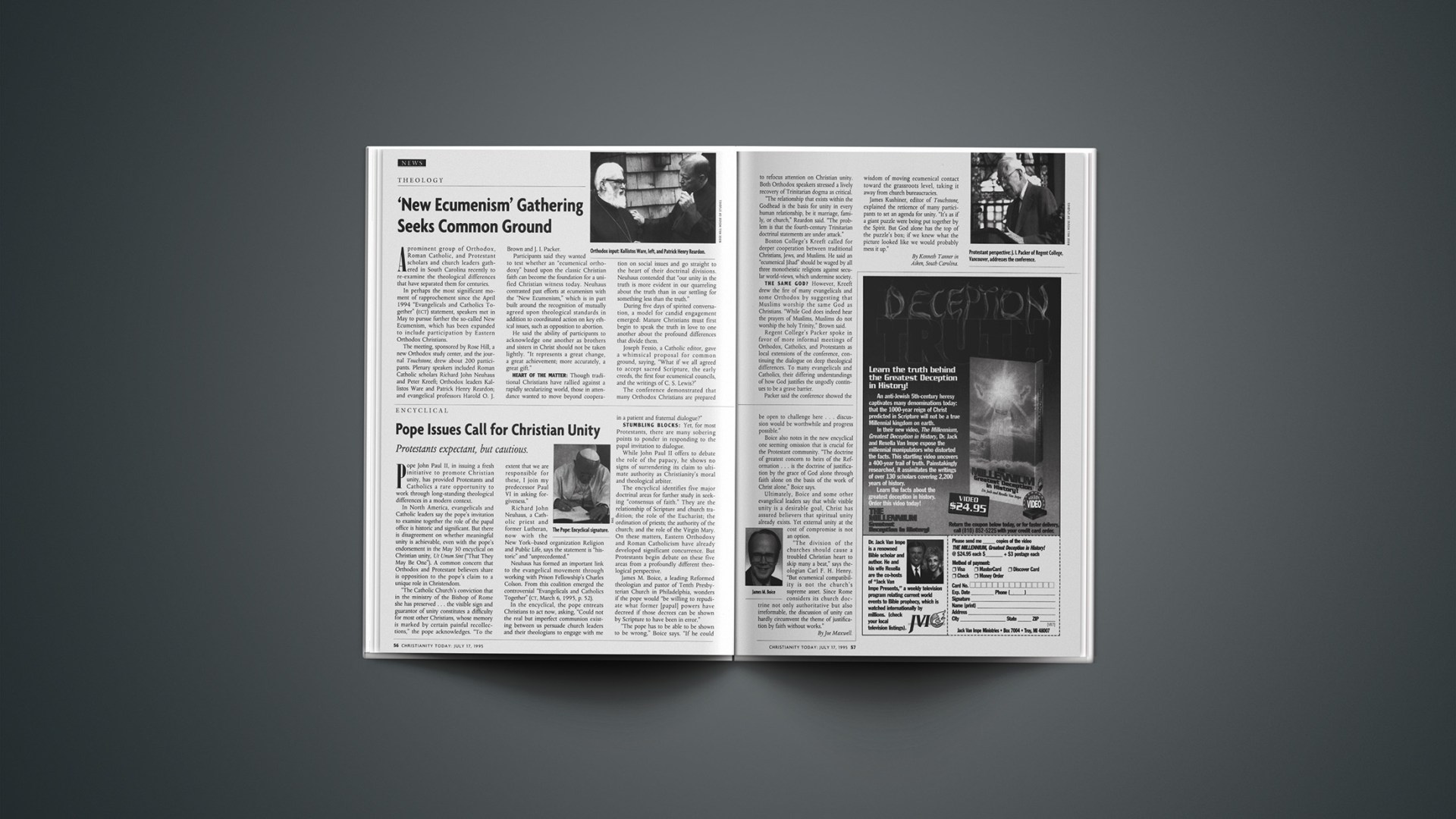Pope John Paul II, in issuing a fresh initiative to promote Christian unity, has provided Protestants and Catholics a rare opportunity to work through long-standing theological differences in a modern context.
In North America, evangelicals and Catholic leaders say the pope’s invitation to examine together the role of the papal office is historic and significant. But there is disagreement on whether meaningful unity is achievable, even with the pope’s endorsement in the May 30 encyclical on Christian unity, Ut Unum Sint (“That They May Be One”). A common concern that Orthodox and Protestant believers share is opposition to the pope’s claim to a unique role in Christendom.
“The Catholic Church’s conviction that in the ministry of the Bishop of Rome she has preserved … the visible sign and guarantor of unity constitutes a difficulty for most other Christians, whose memory is marked by certain painful recollections,” the pope acknowledges. “To the extent that we are responsible for these, I join my predecessor Paul VI in asking forgiveness.”
Richard John Neuhaus, a Catholic priest and former Lutheran, now with the New York-based organization Religion and Public Life, says the statement is “historic” and “unprecedented.”
Neuhaus has formed an important link to the evangelical movement through working with Prison Fellowship’s Charles Colson. From this coalition emerged the controversial “Evangelicals and Catholics Together” (CT, March 6, 1995, p. 52).
In the encyclical, the pope entreats Christians to act now, asking, “Could not the real but imperfect communion existing between us persuade church leaders and their theologians to engage with me in a patient and fraternal dialogue?”
STUMBLING BLOCKS: Yet, for most Protestants, there are many sobering points to ponder in responding to the papal invitation to dialogue.
While John Paul II offers to debate the role of the papacy, he shows no signs of surrendering its claim to ultimate authority as Christianity’s moral and theological arbiter.
The encyclical identifies five major doctrinal areas for further study in seeking “consensus of faith.” They are the relationship of Scripture and church tradition; the role of the Eucharist; the ordination of priests; the authority of the church; and the role of the Virgin Mary. On these matters, Eastern Orthodoxy and Roman Catholicism have already developed significant concurrence. But Protestants begin debate on these five areas from a profoundly different theological perspective.
James M. Boice, a leading Reformed theologian and pastor of Tenth Presbyterian Church in Philadelphia, wonders if the pope would “be willing to repudiate what former [papal] powers have decreed if those decrees can be shown by Scripture to have been in error.”
“The pope has to be able to be shown to be wrong,” Boice says. “If he could be open to challenge here … discussion would be worthwhile and progress possible.”
Boice also notes in the new encyclical one seeming omission that is crucial for the Protestant community. “The doctrine of greatest concern to heirs of the Reformation … is the doctrine of justification by the grace of God alone through faith alone on the basis of the work of Christ alone,” Boice says.
Ultimately, Boice and some other evangelical leaders say that while visible unity is a desirable goal, Christ has assured believers that spiritual unity already exists. Yet external unity at the cost of compromise is not an option.
“The division of the churches should cause a troubled Christian heart to skip many a beat,” says theologian Carl F. H. Henry. “But ecumenical compatibility is not the church’s supreme asset. Since Rome considers its church doctrine not only authoritative but also irreformable, the discussion of unity can hardly circumvent the theme of justification by faith without works.”
Copyright © 1995 Christianity Today. Click for reprint information.
ctcurrmrw5T8057576b










